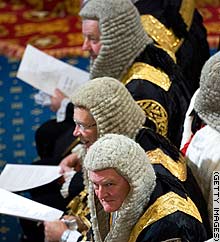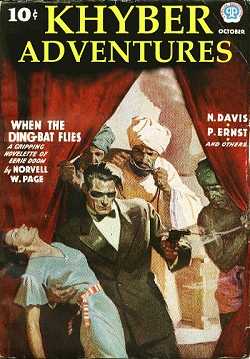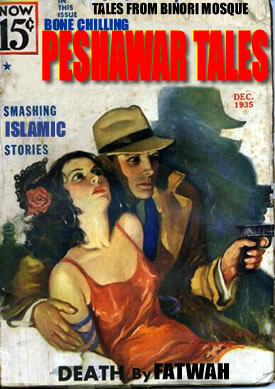As the world at large focused on events in the Arab world and Paks remained preoccupied with CIA contractor Raymond Davis, a jirga composed ostensibly of tribal elders from Kurram Agency, home of an intricately interconnected web of poverty, ignorance, and religious fanaticism announced on February 3, 2011 a 'peace' accord between Shias and Sunnis in Parachinar, the headquarters of the Kurram Agency.
However,
The infamous However ...
a closer look at the players involved in brokering the deal shows that what appears, prima facie, as a welcome solution to years of deadly impasse, is nothing but the Pak establishment's attempt to roll out its own version of the end game in Afghanistan. Never mind the jihadist history of reneging on deals, but without actually addressing the grievances of the Sunnis displaced from Parachinar or the Shias dislodged from Sadda, Jalamai and Chardewal -- let alone restitution for the thousands killed and maimed on both sides -- the deal is bound to end in failure. A senior Pashtun leader, Abdul Lateef Afridi, speaking to this writer, stated: "While the opening of roads is a welcome sign, unless the establishment changes its policy towards Afghanistan, the Kurram deal spells more trouble for the region...an agreement under the auspices of the Pak Pashtun elders may be the only route forward but, unfortunately, none of them were consulted."
The Kurram Agency's geo-strategic importance, with its proximity to the Paktia, Paktika and Khost provinces of Afghanistan on one hand and North Wazoo (NW) and Orakzai Agencies on the other, is well established. A neutral Kurram is imperative for the International Security Assistance Forces (ISAF) to stymie the influx of jihadists from this region into Afghanistan. Conversely, any sustained Taliban intervention into Afghanistan from the Pak side requires open access through upper Kurram. The contiguity of lower and central Kurram to NW and Orakzai can allow jihadists easy transit into Afghanistan. The northeast reaches of upper Kurram, adjoining the Tirah valley and the Tora Bora complex in the Spin Ghar mountain make for a retreat and retraction route for the jihadists -- a conduit used to the fullest benefit by al Qaeda in 2001.
Pakistain has resisted US pressure to take action against the jihadists, especially of the Haqqani network, holed up in NW. However,
The infamous However ...
with the July 2011 date for the start of the US drawdown from Afghanistan looming, the US demand has become urgent. The establishment remains convinced, however, that the US will leave Afghanistan sooner rather than later and therefore hedges its bets for the Kabul throne through its jihadist assets like the Haqqani network. The de facto leader of the network, Sirajuddin, has even been tipped as Pakistain's choice for Mullah Omar's eventual replacement. These assets, therefore, had to be moved to safe havens that could also double as bridgeheads, and Kurram fits that bill.
However,
The infamous However ...
the Turi and Bangash tribes of Kurram refused to play ball with the agencies and their jihadist proxies, with whom they have significant religious doctrinal differences. An armed resistance by the Kurram tribes effectively denied the al Qaeda-Taliban a thoroughfare into Afghanistan, something that directly drew the wrath of Rawalpindi. The deep state then worked overtime to manufacture a sectarian crisis in Kurram in April 2007.
When attempts to gain a foothold in Parachinar failed, the establishment allowed a siege of upper Kurram by the Tehreek-e-Taliban Pakistain (TTP) and their al Qaeda overlords, blockading the Tal-Parachinar road. A humanitarian crisis in upper Kurram was averted only through the efforts of several Pashtun elders, who helped secure the long and arduous Parachinar-Khost-Gardez-Kabul-Beautiful Downtown Peshawar route as an alternative. Cessna flights to Parachinar operated by the Peshawar Flying Club, though very expensive, were an added relief line. The reprieve thus gained by the Turis and Bangash of upper Kurram reinforced their resolve to fight on and continue denying sanctuary and conduit to the jihadists.
Watching the keystone of its plan for post-US Afghanistan unravelled by the ragtag Kurramis, the establishment decided, in the words of one Colonel Sajjad, to "teach the Turis a lesson". In September 2010, Colonel Tausif Akhtar of the Pak security forces announced closure of five border entry points to "clamp down on sectarian violence". The Kurramis were thus squished between the hammer and anvil of a state-sponsored double embargo. The state also interrupted the small aircraft sorties from Peshawar. The isolation of upper Kurram was now complete. Having pushed them against the wall, the establishment felt that the Kurramis might be amenable to a settlement.
While the Pak media went hoarse over Raymond Davis, it conveniently ignored several other foreign thugs of the tallest order, operating with impunity inside Pakistain. The media has portrayed a TTP commander, Fazl-e-Saeed of Uchat village (lower Kurram), as the guarantor of the Kurram deal. The fact, however, is that the Pak establishment imposed Khalil Haqqani (an uncle of Sirajuddin Haqqani) as an arbiter, as early as October 2010 (as noted then in this column). Khalil Haqqani was the most influential jihadist involved in getting the February 3 deal off the ground.
The irony is that while Pak intelligence services and that drama queen of a foreign minister were wailing about a CIA man running amok in Lahore, Khalil Haqqani was conducting a jirga a stone's throw away from Islamabad in Bhara Kahu, where he reportedly maintains a business concern. These meetings were attended by some six Shia Kurramis, including Haji Aun Ali, Laiq Hussain, Captain Yousaf, Councillor Iqbal Hussain and MNA Sajid Turi. MNA Munir Orakzai and Senator Rashid Ahmed were among the eight Sunnis representing lower and central Kurram. Federal Interior Minister Rehman Malik, reportedly, also attended the meetings with Khalil Haqqani -- a man declared a 'Specially Designated Global Terrorist' by the US earlier this month.
The Haqqani network has freely used the Pir Qayyum, Sateen and Shasho camp (an old hub of Rasul Sayyaf in the 1980s) areas of lower Kurram but really needed open access to its bases in Tari Mangal, Mata Sangar, Makhrani, Wacha Darra and Spina Shaga in upper Kurram to launch attacks into Afghanistan in the upcoming summer fighting. By coercing the Kurramis into accepting the writ of the Haqqani network, the Pak establishment has cast its lot with the jihadists.
It remains to be seen if this strategy to use upper Kurram against the US will work. But for now the deep state has sacrificed Kurram at the altar of global jihad. |
 [DAWN] Iqbal Khan, the father of Mashal Khan, has requested the Beautiful Downtown Peshawar
[DAWN] Iqbal Khan, the father of Mashal Khan, has requested the Beautiful Downtown Peshawar

 [Dawn] Police on Thursday resorted to
[Dawn] Police on Thursday resorted to  PESHAWAR: The participants at a national conference here on Monday asked the government to take the issue of drone strikes to the
PESHAWAR: The participants at a national conference here on Monday asked the government to take the issue of drone strikes to the 
 Mohmand
Mohmand The lawyers observed boycott of courts here on Monday to show solidarity with the judiciary and Chief Justice of Pakistain Justice Iftikhar Mohammad Chaudhry, resolving to foil any conspiracy hatched against the superior judiciary.
The lawyers observed boycott of courts here on Monday to show solidarity with the judiciary and Chief Justice of Pakistain Justice Iftikhar Mohammad Chaudhry, resolving to foil any conspiracy hatched against the superior judiciary. The visit of a delegation of Awami National Party leaders to the district on Wednesday failed to bear fruits as it couldn`t end differences between two groups of the party.
The visit of a delegation of Awami National Party leaders to the district on Wednesday failed to bear fruits as it couldn`t end differences between two groups of the party. [Dawn] Almost all mainstream political parties demanded of the government during a jirga here on Monday to hold negotiations with the non-state actors instead of conducting military operations in the Federally Administered Tribal Areas (Fata).
[Dawn] Almost all mainstream political parties demanded of the government during a jirga here on Monday to hold negotiations with the non-state actors instead of conducting military operations in the Federally Administered Tribal Areas (Fata).